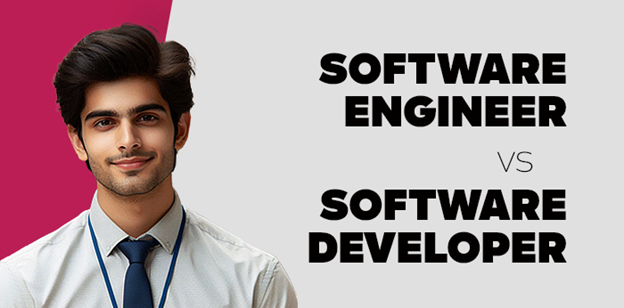
Despite their common use, software engineers and developers are in different positions in the software development lifecycle. Software engineers design, create, and maintain software systems employing architecture, problem-solving, and project management. Instead, developers build, test, and debug individual software components to turn plans into functioning code. Both professions need excellent technical skills, problem-solving talents, and a dedication to continual learning, although engineers focus on system-level thinking and developers on code. You can propel your career with Amrita AHEAD, Amrita Vishwa Vidyapeetham.
Join 100% Online Degree programs UGC Entitled and Affordable
A software engineer is an individual who utilizes engineering concepts to create, enhance, evaluate, and sustain software applications. They combine their technical skills with innovative ideas to provide efficient and dependable software solutions. Software engineers are responsible for designing and building many types of software, ranging from mobile applications to intricate operating systems. They play a crucial role in shaping the digital landscape. Their job requires a profound comprehension of programming languages, data structures, algorithms, and software development techniques.
As a software developer, one possesses the expertise to develop, test, and upkeep software applications. They deeply understand the digital realm, turning concepts into practical software solutions. With the help of programming languages and development tools, software developers can create a wide range of applications, from mobile apps and websites to intricate enterprise systems. Their role requires a deep understanding of user needs, the ability to design software architecture, proficient coding skills, and a keen eye for ensuring the software operates smoothly and optimally. In the case of a software developer, you can achieve your career by pursuing a degree in both a Master of Computer Application (MCA) and a Bachelor of Computer Application (BCA).
|
Feature |
Software Engineer |
Software Developer |
|
Focus |
System design, architecture, development, testing, and maintenance |
Coding, testing, and debugging software components |
|
Scope |
Entire software system |
Specific software modules or features |
|
Approach |
Big-picture thinking, problem-solving |
Technical implementation |
|
Knowledge |
Software engineering principles, algorithms, data structures, system design |
Programming languages, frameworks, and development tools |
|
Role |
Often leads development teams, makes strategic decisions |
Contributes to development teams, focuses on code implementation |
|
Career Path |
Can progress to lead architect, technical director |
Can specialise in specific technologies or become a senior developer |
Although software engineers and developers have different responsibilities, they have numerous essential commonalities that are the foundation of both professions.
Software Engineer Qualifications
A software engineer typically requires a higher level of education and a broader skill set compared to a software developer.
Education:
Certifications: While not always mandatory, certifications like Certified Software Development Professional (CSDP) or Certified Software Architect (CSA) can enhance career prospects.
Software Developer Qualifications
Software developers typically require a strong foundation in programming and problem-solving skills.
Education:
Certifications: While not mandatory, certifications like Certified Software Developer (CSD) can validate skills.
Although the phrases “software engineer” and “software developer” are sometimes used interchangeably, their professional paths can range dramatically. Both positions provide stimulating prospects for development and expertise, but the routes to progress vary depending on skill sets and interests.
Software Developer Career Path
Junior developers commonly begin their careers in software development by acquiring practical expertise in coding, testing, and debugging. As their competence grows, individuals can progress to senior developer roles, where they are responsible for handling more intricate projects and providing guidance to junior team members.
Software Engineer Career Path
Software engineers often start in similar roles as developers but tend to focus more on system design, architecture, and problem-solving. They progress to senior software engineer positions, taking ownership of complex systems and leading development teams.
General Software Engineer Salary Ranges in India (INR)
|
Experience Level |
Typical Salary Range (INR Lakhs) |
|
Entry Level (0-2 years) |
6-12 |
|
Junior (2-5 years) |
8-18 |
|
Mid-Level (5-8 years) |
12-25 |
|
Senior (8+ years) |
20+ |
|
Experience Level |
Typical Salary Range (INR Lakhs) |
|
Entry Level (0-2 years) |
4-8 |
|
Junior (2-5 years) |
6-12 |
|
Mid-Level (5-8 years) |
8-18 |
|
Senior (8+ years) |
12+ |
Software Engineer:
A software engineer is a problem solver who designs, develops, tests, and maintains complex software systems. They take a holistic approach, considering the entire software lifecycle from conception to deployment.
Key Skills:
Software Developer:
A software developer focuses on writing, testing, and maintaining code to implement specific software features. They are skilled in programming languages and can translate design specifications into functional software.
Key Skills:
Overlapping Skills
While there are clear distinctions, software engineers and developers often share common skills:
Software engineers and developers are both integral to the software development process, but their roles and responsibilities differ. While software developers focus on coding, testing, and maintaining specific software components, software engineers take a broader approach, designing and architecting entire software systems. Both require strong technical skills, problem-solving abilities, and a passion for technology, but software engineers typically possess a higher level of education and a broader skill set. Amrita AHEAD, Amrita University provides both graduate and postgraduate courses in Computer Application. Ultimately, the path you choose depends on your interest in coding versus system design and project management.
You May Also Like: